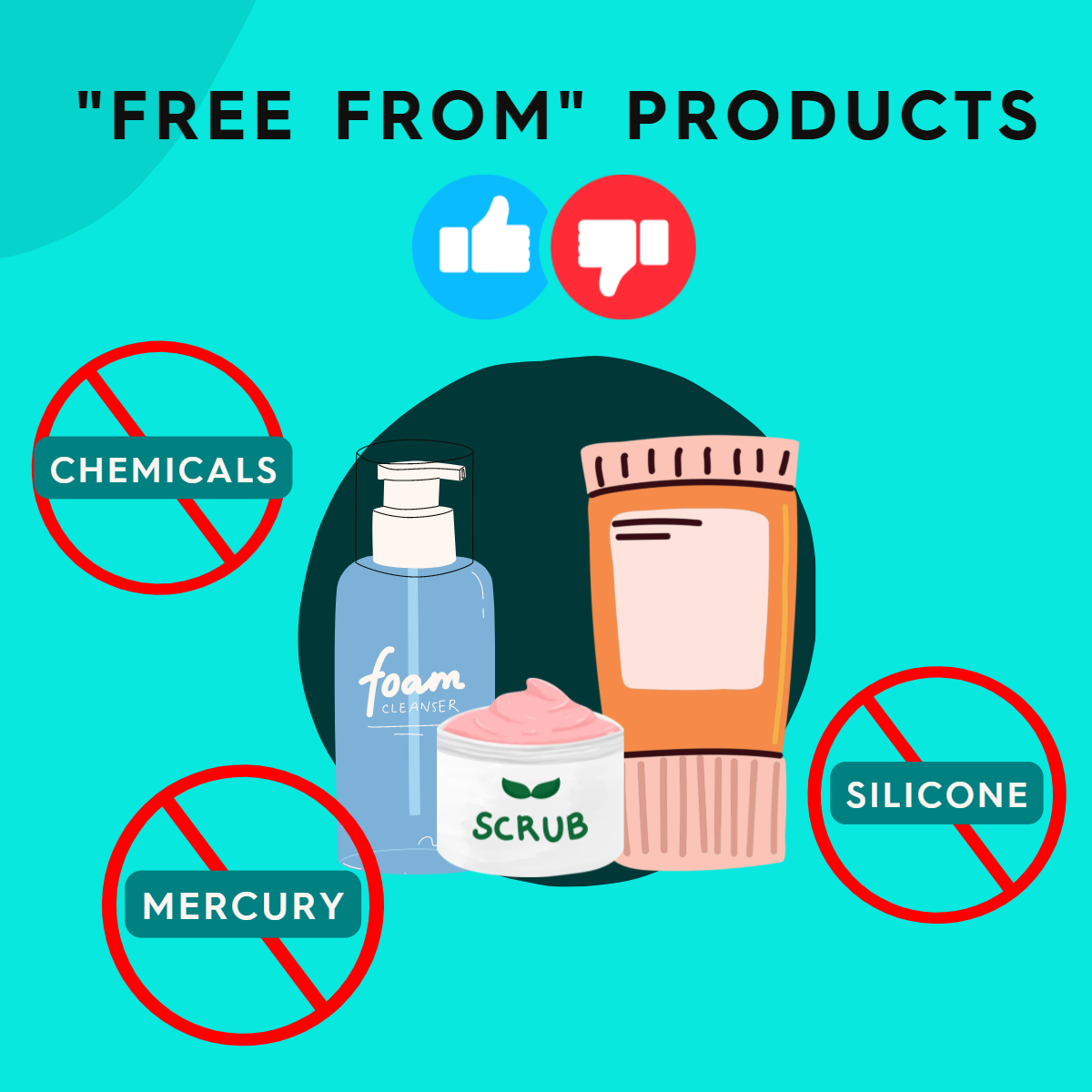There is a popular idiom in English that goes “don’t judge a book by its cover.” You may have heard of it before or something else that carries the same meaning. Although a famous saying, you already know there is nothing we do more than judging something based on its appearance. When it comes to cosmetics, we easily succumb to judgement by looking at the bottle, tube, or container of the product. By doing so, we tend to fall for the so called positive claims written on the product itself. “What claims?” you may ask. Well, in this article we’re looking into the “free from” claims which are a common marketing tactic used over the recent years. Free from chemicals, free from toxins, free from silicone; you name it!

The question is, should you be buying products with “free from” claims? This article will stimulate you to rationally think whether they are better than products that don’t have “free from” claims, so read on :)
Are “Free From” Claims Actually True?
We are confident to say that the majority of us that study and value the science side of the cosmetic industry, absolutely hate this claim. Although the “free from” list can go on and on, it doesn’t denote that the product is better. Here’s why:
1. They’re Free From Banned Ingredients

It certainly seems funny when a brand says that their products are free from obviously banned ingredients such as mercury and formaldehyde. These claims are useless because the cosmetic regulations in respective countries have publicly prohibited the inclusion of these harmful ingredients in cosmetics. No product should contain these ingredients so it wouldn’t make ANY product special if it doesn’t contain these ingredients. If that’s the case, why print them on products?
Isn’t it strange when someone gives you an obvious bowl of green leafy vegetables and tells you loud and confident that it is “free from meat?”
2. They’re Free From Safe Ingredients

These claims exasperate all sincere cosmetic scientists to the extreme and are extremely repulsive.
- “Free From Chemicals” – Water (as a chemical compound with one oxygen and two hydrogen atoms) is considered a chemical, undeniably. Seemingly natural olive oil with up to 85% of oleic acid (a form of fatty acid with chemical formula CH3(CH2)7CH=CH(CH2)7COOH) is made up of chemicals, without a doubt. The same goes for all individual ingredients that make up cosmetic products. They are all chemicals and this makes the claim of being “chemical free” untruthful.
- “Free From Parabens/Petrolatum/Silicone/SLES…” – These harmless ingredients have years of endless research backing up their stability and safeness when used topically within appropriate concentration. As one of the longest and research-proven safest preservative used in cosmetic products, parabens are also found naturally in blueberries, mango, strawberries, peaches and a lot more. On the other hand, petrolatum gauze and silicone coating are commonly used to dress burn wounds by professionals in the burn unit/hospital. All these ingredients are not harsh and cruel to use on our bodies, so there is basically no motive for this label.
The above mentioned are just the tip of the iceberg. There are plenty of other safe ingredients that are marketed as harmful as well. These fear-mongering claims are mostly created by people in marketing, who most probably know nothing about cosmetic science. Their job is to play with the fear of consumers and affect them psychologically.
From the evolutionary perspective, we progressed in a world where a small movement behind the bushes would prompt us to think that it could be a tiger. We tend to intensify our own fear when we hear the false and fear deriving claims of certain ingredients from advertisements, articles or people around us. We then turn to look for something that would be a solution to all our problems and end up buying a product with many “free from” claims.

As a result of powerful fear-mongering rumours generated by these people, safe ingredients are despised and weeded out by the public. Cosmetic chemists in the lab are told to formulate products without these long-established safe ingredients. Instead, they are forced to not look at the research, but look into the memory of consumers so they can exclude the safe ingredients with bad impressions and include some less safe alternatives/ingredients in the formulation of products.
It’s no wonder people on the science side of the cosmetic industry find such claims to be heart-breaking.
3. Free From Allowed but Possibly-Sensitizing Ingredients

If you look at it rationally, not all “free from” claims are evil. Personally, we can think of one common claim that really carries value to consumers. There are indeed brilliant brands out there that genuinely want to provide products that fulfil the needs of people who have problems with certain ingredients.
Fragrance (synthetic or natural) for instance, has been empirically proven to cause sensitive reactions for some. Fragrance is especially notorious for its damaging results with absolutely no real benefit for the skin. If you have sensitive skin, you’ll find that the free from alcohol claim is valid for you. However, it is worth noting that even if you don’t have sensitive skin, consistent use of irritating ingredients will put you at risk of having sensitive skin later.
Therefore, the free from fragrance claim would be useful for beauty shoppers like us :) It is also greatly beneficial to mention if a product is free from animal-derived ingredients for consumers with religious concerns. Coming back to the example given earlier, it sounds perfectly fine when someone gives you an obvious bowl of green leafy vegetables and tells you loud and confident that it is free from pesticides.
Your Sharing: What do you think? Are you in favour of any “free from” claims you deem important when you shop for a skin care product?


